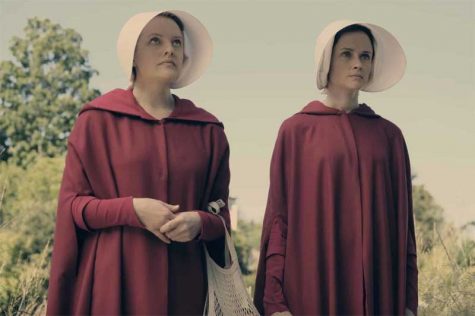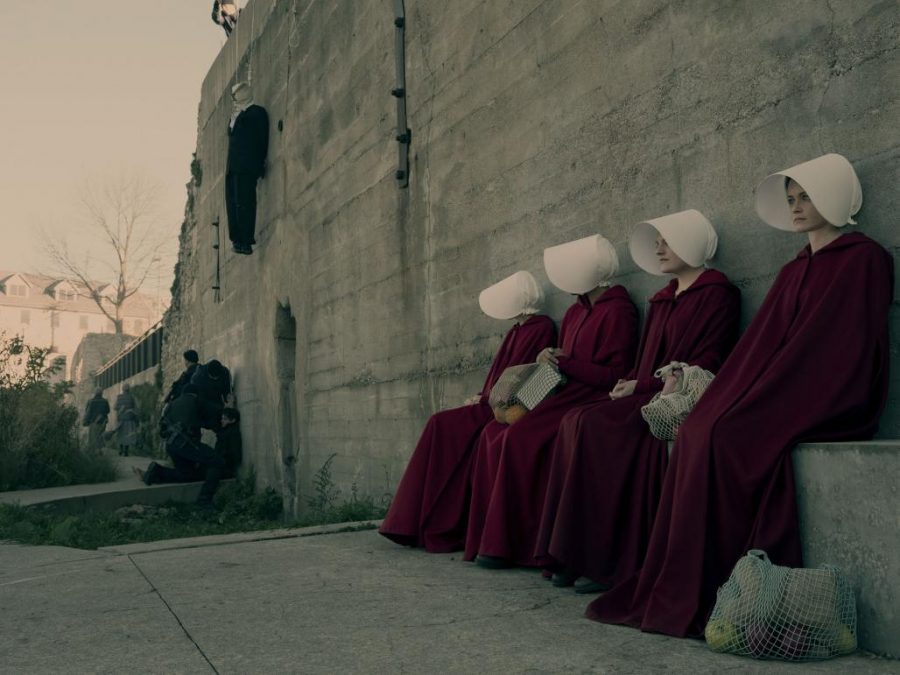Blessed Be the Fruit…May the Lord Open…
May 11, 2018
In 1985, Canadian author Margaret Atwood published a 311-page dystopian novel that has forever changed the essence of feminism. The totalitarian rule of Gilead and the proximity of this dystopian society to ours today has certainly disconcerted more than a few reader’s minds. Last year, an award-winning show based on the book was released on Hulu, reviving the franchise’s popularity and pulling in new fans, myself included.
The novel of The Handmaid’s Tale is told through the perspective of a Handmaid by the given name of Offred (the name after Of is the name of the Commander that each Handmaid is assigned to) and the readers never find out the real name of the narrator, though in the show, Offred’s real name is revealed early in the first season, which is one of many changes made from the book to show.
The dystopian setting of The Handmaid’s Tale first seems outlandish, but the captivating narrative of the novel makes its world feel almost plausible. After a series of drops in birth rates, children are rare and precious in the near future. Then, the government collapses as terrorist attacks occur and a terrorist group seizes control of the U.S., renaming it The Republic of Gilead. Based on biblical ideals and a twisted view of Christianity, this new dystopian society is utterly confining and stringent. For example, the majority of women are prohibited from reading or writing. The only women allowed to participate in these activities are the Aunts, infertile women in positions of power; they train Handmaids and guard the Colony. Every month, the Handmaids must participate in the Ceremony, a ritual during which they are brutally raped. The idea of Handmaids sprouts from the story of Rachel and her servant, Bilhah; the Marthas, infertile women who cook and clean for the Wives and the Commanders, comes from Martha, Mary’s sister, who preferred serving Jesus rather than listening to his teachings. The protagonist of the tale, Offred, had a daughter and a husband before her old life was abruptly destroyed and she was thrust into the new life of a Handmaid.

The Hulu show returned with its second season on Wednesday, May 2nd, and now the plot has veered off the canonical path of the novel. Some elements from the book still remain but the writers are now adding their own creative what-happens-next events. In the second season, we’re exposed to more flashbacks that Offred has, including ones of her mother, as well as flashbacks of other characters such as Ofglen and insights into life in the Colonies. The Colonies are lands that have been contaminated and polluted by radioactive waste that is blamed as one cause of infertility amongst most women. Whoever is deemed unfit by the society of Gilead is punished through execution or sent here. Without giving the plot away, the events of the second season aren’t pretty.

Of course, basing a show on a novel often doesn’t mean including every detail, but the show is impactful in its own ways. Seeing the Handmaids, Wives, and Commanders living in regular suburban houses and utilizing cars that we use today accents how realistic Gilead is, as it looks so much like the world we live in today, which is something other dystopian settings don’t tend to do.
I recommend both the book and the show to everyone, regardless of gender, because of its powerful display of human rights in a place of authoritarian oppressors. The empowering words, “Nolite Te Bastardes Carborundum,” will never leave me, and I’m sure they’ll empower you too.


















































































































































